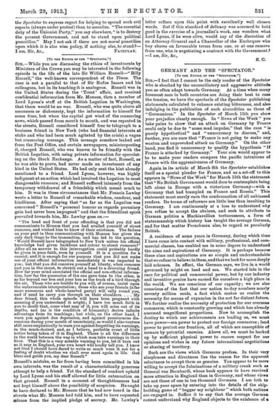[To THE EDITOR OF THE "SPECTATOR."]
Sra,—While you are discussing the ethics of investments by Ministers of the Crown you may be interested in the following episode in the life of the late Sir William Russell—" Billy Russell," the well-known correspondent of the Times. The case is not a parallel to that of Sir Rufus Isaacs and his colleagues, but in its teaching it is analogous. Russell was in the United States during the ' Trent ' affair, and received confidential information from Mr. Monson, then a member of Lord Lyons's staff at the British Legation in Washington, that there would be no war. Russell, who was quite above all meanness or dishonesty, kept the information to himself for some time, but when the capital got wind of the reassuring news, which passed from mouth to mouth, and was repeated in the streets, Russell considered himself free to telegraph to a business friend in New York (who had financial interests at stake and who had been much agitated by the crisis) a vague but reassuring message. This message somehow leaked out from the Post Office, and certain newspapers, misinterpreting it, charged Russell, who was known to be friendly with the British Legation, with using private information for speculat- ing on the Stock Exchange. As a matter of fact, Russell, as he was able to prove, had never made an investment of any kind in the United States. He had only sent the hint already mentioned to a friend. Lord Lyons, however, was highly indignant at an action which had involved the Legation in most disagreeable rumours ; and Russell suffered intensely from the temporary withdrawal of a friendship which meant much to him. It was in these circumstances that Mr. Francis Lawley wrote a letter to Russell of remarkable wisdom, candour, and kindliness. After saying that "as far as the Legation was concerned" Russell's "personal honour as regards pecuniary gain had never been impugned" and that the friendliest spirit prevailed towards him, Mr. Lawley goes on
"The head and front of your offending is that you did not communicate to Monson that you had availed yourself of street rumours, and wished him to know of their existence. The failure on your part in thus communicating with Monson has given the only dark tinge to the transaction, and has led to the question, Would Russell have telegraphed to New York unless his official knowledge had given backbone and colour to street rumours?' After all an answer to this interrogation could probably hardly be given in pure faith, even by yourself. It is a question for a casuist, and it is enough for our purpose that you did not make use of your official information immediately it was imparted to you ; but that you did conceive yourself at liberty, when rumours met you in the street, to stretch out a hand to a drowning friend. How far your mind associated the official and non-official informa- tion, how far the possession of the one gave tone to the other, is as far beyond our ken and your ken as the track of a bird through the air. Those who are hostile to you will, of course, insist upon the unfavourable interpretation ; those who are your friends (a far more numerous and whole-hearted party) will rally round you, and if need be carry you through on their shoulders. . . . My dear friend, this whole episode will have been pregnant with meaning if you understand it aright; I have too much faith in you to doubt that, come what may of it, you will arise out of its depths, and (as is the condition of humanity) derive infinite advantage from its teachings ; but while, on the other hand, I warn you against due depression, and against promiscuous dis- cussions during your month of uncertainty, so would I also venture still more emphatically to warn you against forgetting its warnings, in the much-desired, and, as I believe, probable event of little notice being taken of it in England. There is all the difference in the world between the way in which men take warnings in their lives. That this is a very notable warning to you, let it turn out as it may in England, your own heart will loudly tell you. I know not that I should have dared to write so much were it not for a feeling of doubt whether we shall ever meet again in life. God bless and guide you, my dear Russell."
Russell's mistake, so far from having been committed in his own interests, was the result of a characteristically generous attempt to help a friend. Yet the standard of conduct upheld by Lord Lyons and his staff allowed for little extenuation on that ground. Russell in a moment of thoughtlessness had not kept himself above the possibility of suspicion. He ought to have declared to Mr. Monson that he had now heard in the streets what Mr. Monson had told him, and to have requested imlease from the implied pledge of secrecy. Mr. Lawley's letter refines upon this point with excellently well chosen words. But if this standard of delicacy was assumed to bold good in the exercise of a journalist's work, one wonders what Lord Lyons, if he were alive, would say of the discretion of an Attorney-General and a Chancellor of the Exchequer who buy shares on favourable terms from one, or at one remove from one, who is negotiating a contract with the Government ? —I am, Sir, &c.,










































 Previous page
Previous page